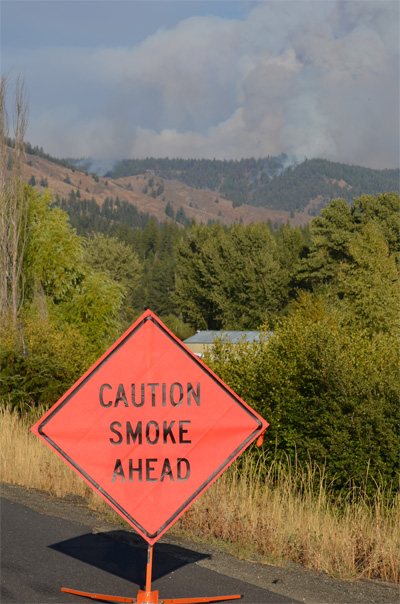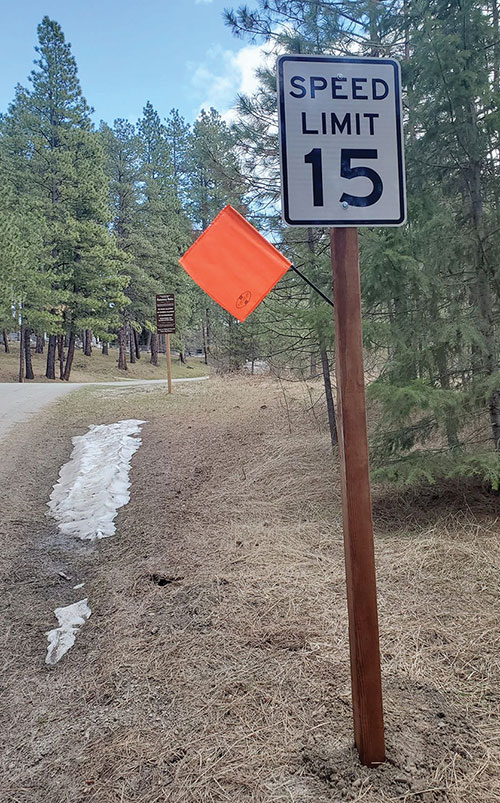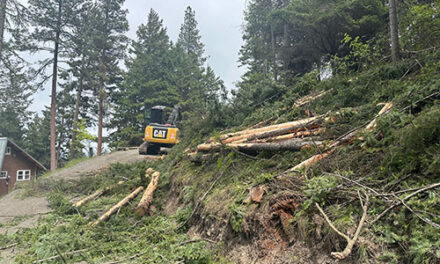UPDATE: 4:50 P.M. – Thursday, 9/20/2012 – Table Mountain Fire – Air Quality and Smoke Safety Update
Kittitas County, WA – It is the recommendation of the Kittitas County Health Officer that as long as wildfire smoke in our area is categorized by the Department of Ecology as “very unhealthy” or “hazardous”, preventative methods should be used to reduce exposure.
Safety/Health:
Symptoms related to smoke from wildfire:
- Eye, nose and/or throat irritation–runny eyes and/or nose.
- Coughing, sore throat.
- Trouble breathing or tightness of the chest, which may be symptoms of a health emergency.
- The onset of symptoms related to pre-existing masky ailments like asthma or emphysema.
- Especially following days or weeks of smoke exposure, increased short-term likelihood of getting a cold or having similar symptoms of less effective immune responses.
If symptoms persist or are severe, contact your primary health care provider.
Anyone living in areas affected by wildfire smoke categorized by D.O.E. as very unhealthy or hazardous should use preventative methods to reduce exposure. If being outside cannot be avoided, remaining indoors and using N-95 masks can provide some protection for sensitive population and persons working outdoors if worn properly.
Citizens should:
- Reduce physical exertion
- Stay indoors when possible, with air conditions and fans set on recirculation.
- If you have a heart or lung problem, consult with your doctor before using a mask.
- Choose a mask that has two straps that go around your head. DO NOT choose a mask with only one strap or one with straps that just hook over the ears. (N-95 masks do not protect against vapors or fumes).
- Choose a size that will fit over your nose and under your chin. It should seal tightly to your face.
- Place the mask over your nose and under your chin, with one strap placed below the ears and one strap above.
- Pinch the metal part of the mask tightly over the top of your nose.
- The mask fits best on clean-shaven skin.
- Remove earrings and jewelry before using the equipment to prevent catching them on the mask.
- Check in a mirror to ensure that your mask fits properly. No “fit-test” is required for smoke-related use only.
- Do not use bandanas (wet or dry), paper or surgical masks, or tissues held over the mouth and nose. These will not protect your lungs from wildfire smoke.
- Throw out your mask when it gets harder to breathe through or if the inside gets dirty.
- Use a new mask each day if you can.
- It it is harder to breathe through a mask, so take breaks often if you work outside.
- If you feel dizzy or nauseated, go to a less smoky area, take off your mask, and get medical help.
- Stay in vehicles utilizing recirculating air conditioners or fans.
- If employees must be outside in poor air quality, utilize N 95 masks to reduce particulate inhalation. Make sure N 95 Mask is properly fitted.
Currently the following distribution points have been identified:
- Kittitas County Public Health Department
- Kittitas Valley Community Hospital
- Central Washington University Student Health Clinic
- You may purchase masks at many local area stores as well.
It is advised that masks be reserved for those who have respiratory issues or those that cannot remain indoors with a recirculating filter air system.
The Kittitas County Public Health Department has N-95 masks available for distribution at 507 N. Nanum Street, Ellensburg, WA. Masks may be picked up Monday through Friday, 9:00 a.m. to 5:00 p.m. If citizens have a prescription for N-95 masks, they can get them at the Kittitas Valley Community Hospital.
===============================================
 During conditions of unhealthy to hazardous air quality, the Kittitas County Public Health Department encourages everyone living in Kittitas County (and neighboring areas affected by smoke) to:
During conditions of unhealthy to hazardous air quality, the Kittitas County Public Health Department encourages everyone living in Kittitas County (and neighboring areas affected by smoke) to:
- Limit outdoor activity, staying indoors if possible,
- Avoid outdoor physical activity,
- Keep doors and windows closed in buildings and cars,
- Set air conditioning to “recycle” or “recirculate,”
- Consider spending time or re-locating temporarily to a location with better air quality if you are experiencing negative symptoms related to the air quality. Adverse symptoms may include dizziness, headache, difficulty breathing, coughing, excessive phlegm, and nausea. Please contact your health care provider if you experience any of these symptoms.
This recommendation applies to everyone when the air quality is in the unhealthy, very unhealthy, or hazardous range, but it is especially important for sensitive groups which include:
- People with pre-existing lung or heart conditions such as asthma or emphysema, diabetes, or other respiratory infections;
- People who have had a stroke;
- Infants, children, and adults older than 65; and
- Pregnant women.
On Tuesday, Kittitas County experienced hazardous air quality due to the wildfire smoke from the fires that continue to burn. According to the Washington State Department of Ecology air quality monitoring site in Ellensburg, the air quality fluctuated between “very unhealthy” and “hazardous” throughout the day. (The range of air quality categories include good, moderate, unhealthy for sensitive groups, unhealthy, very unhealthy, and hazardous.) There was some clearing late in the day yesterday, but smoke filtered in during the night and air quality was in the “unhealthy” range this morning.
The air stagnation advisory issued by the National Weather Service is in effect through today, although smoky conditions are forecast at least through Friday. Air stagnation can worsen air quality conditions.
Kittitas County residents, schools, child cares, and sports organizers are encouraged to check the current air quality status on the Washington State Department of Ecology air monitoring site at https://fortress.wa.gov/ecy/enviwa/. The Washington Air Quality Advisory (WAQA) Chart which describes recommendations for each level of air quality can be found at https://fortress.wa.gov/ecy/enviwa/App_AQI/AQI.en-US.pdf or by clicking on the legend on the air monitoring site. The Kittitas County Health Officer recommends that children and other sensitive populations should be kept indoors and avoid heavy physical activity outdoors anytime the air quality is “unhealthy for sensitive populations” or worse.





